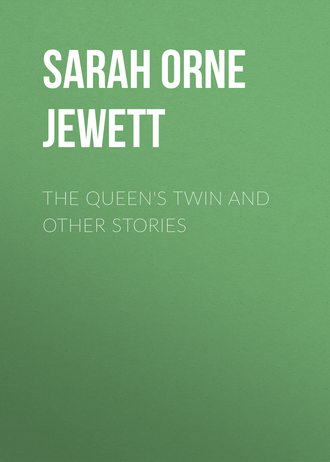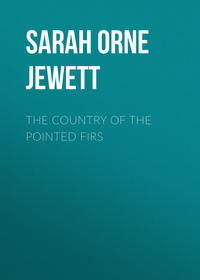
The Queen's Twin and Other Stories
"I s'pose you did have a very nice tea?" suggested Abby, with interest.
"Oh, a beautiful tea! She could n't have done more if I 'd been the Queen," said Mrs. Hand. "I don't know how she could ever have done it all in the time, I 'm sure. The table was loaded down; there was cup-custards and custard pie, an' cream pie, an' two kinds o' hot biscuits, an' black tea as well as green, an' elegant cake,—one kind she 'd just made new, and called it quick cake; I 've often made it since—an' she 'd opened her best preserves, two kinds. We set down together, an' I 'm sure I appreciated what she 'd done; but 't wa'n't no time for real conversation whilst we was to the table, and before we got quite through the doctor come hurryin' along, an' I had to leave. He asked us if we 'd had a good talk, as we come out, an' I could n't help laughing to myself; but she said quite hearty that she 'd had a nice visit from me. She appeared well satisfied, Mis' Fulham did; but for me, I was disappointed; an' early that fall she died."
Abby Pendexter was laughing like a girl; the speaker's tone had grown more and more complaining. "I do call that a funny experience," she said. "'Better a dinner o' herbs.' I guess that text must ha' risen to your mind in connection. You must tell that to Aunt Cynthy, if conversation seems to fail." And she laughed again, but Mrs. Hand still looked solemn and reproachful.
"Here we are; there 's Aunt Cynthy's lane right ahead, there by the great yellow birch," said Abby. "I must say, you 've made the way seem very short, Mis' Hand."
III
Old Aunt Cynthia Dallett sat in her high-backed rocking-chair by the little north window, which was her favorite dwelling-place.
"New Year's Day again," she said, aloud,—"New Year's Day again!" And she folded her old bent hands, and looked out at the great woodland view and the hills without really seeing them, she was lost in so deep a reverie. "I 'm gittin' to be very old," she added, after a little while.
It was perfectly still in the small gray house. Outside in the apple-trees there were some blue-jays flitting about and calling noisily, like schoolboys fighting at their games. The kitchen was full of pale winter sunshine. It was more like late October than the first of January, and the plain little room seemed to smile back into the sun's face. The outer door was standing open into the green dooryard, and a fat small dog lay asleep on the step. A capacious cupboard stood behind Mrs. Dallett's chair and kept the wind away from her corner. Its doors and drawers were painted a clean lead-color, and there were places round the knobs and buttons where the touch of hands had worn deep into the wood. Every braided rug was straight on the floor. The square clock on its shelf between the front windows looked as if it had just had its face washed and been wound up for a whole year to come. If Mrs. Dallett turned her head she could look into the bedroom, where her plump feather bed was covered with its dark blue homespun winter quilt. It was all very peaceful and comfortable, but it was very lonely. By her side, on a light-stand, lay the religious newspaper of her denomination, and a pair of spectacles whose jointed silver bows looked like a funny two-legged beetle cast helplessly upon its back.
"New Year's Day again," said old Cynthia Dallett. Time had left nobody in her house to wish her a Happy New Year,—she was the last one left in the old nest. "I 'm gittin' to be very old," she said for the second time; it seemed to be all there was to say.
She was keeping a careful eye on her friendly clock, but it was hardly past the middle of the morning, and there was no excuse for moving; it was the long hour between the end of her slow morning work and the appointed time for beginning to get dinner. She was so stiff and lame that this hour's rest was usually most welcome, but to-day she sat as if it were Sunday, and did not take up her old shallow splint basket of braiding-rags from the side of her footstool.
"I do hope Abby Pendexter 'll make out to git up to see me this afternoon as usual," she continued. "I know 't ain't so easy for her to get up the hill as it used to be, but I do seem to want to see some o' my own folks. I wish 't I 'd thought to send her word I expected her when Jabez Hooper went back after he came up here with the flour. I 'd like to have had her come prepared to stop two or three days."
A little chickadee perched on the window-sill outside and bobbed his head sideways to look in, and then pecked impatiently at the glass. The old woman laughed at him with childish pleasure and felt companioned; it was pleasant at that moment to see the life in even a bird's bright eye.
"Sign of a stranger," she said, as he whisked his wings and flew away in a hurry. "I must throw out some crumbs for 'em; it's getting to be hard pickin' for the stayin'-birds." She looked past the trees of her little orchard now with seeing eyes, and followed the long forest slopes that led downward to the lowland country. She could see the two white steeples of Fairfield Village, and the map of fields and pastures along the valley beyond, and the great hills across the valley to the westward. The scattered houses looked like toys that had been scattered by children. She knew their lights by night, and watched the smoke of their chimneys by day. Far to the northward were higher mountains, and these were already white with snow. Winter was already in sight, but to-day the wind was in the south, and the snow seemed only part of a great picture.
"I do hope the cold 'll keep off a while longer," thought Mrs. Dallett.
"I don't know how I 'm going to get along after the deep snow comes."
The little dog suddenly waked, as if he had had a bad dream, and after giving a few anxious whines he began to bark outrageously. His mistress tried, as usual, to appeal to his better feelings.
"'T ain't nobody, Tiger," she said. "Can't you have some patience? Maybe it's some foolish boys that's rangin' about with their guns." But Tiger kept on, and even took the trouble to waddle in on his short legs, barking all the way. He looked warningly at her, and then turned and ran out again. Then she saw him go hurrying down to the bars, as if it were an occasion of unusual interest.
"I guess somebody is comin'; he don't act as if 't were a vagrant kind o' noise; must really be somebody in our lane." And Mrs. Dallett smoothed her apron and gave an anxious housekeeper's glance round the kitchen. None of her state visitors, the minister or the deacons, ever came in the morning. Country people are usually too busy to go visiting in the forenoons.
Presently two figures appeared where the road came out of the woods,—the two women already known to the story, but very surprising to Mrs. Dallett; the short, thin one was easily recognized as Abby Pendexter, and the taller, stout one was soon discovered to be Mrs. Hand. Their old friend's heart was in a glow. As the guests approached they could see her pale face with its thin white hair framed under the close black silk handkerchief.
"There she is at her window smilin' away!" exclaimed Mrs. Hand; but by the time they reached the doorstep she stood waiting to meet them.
"Why, you two dear creatur's!" she said, with a beaming smile. "I don't know when I 've ever been so glad to see folks comin'. I had a kind of left-all-alone feelin' this mornin', an' I didn't even make bold to be certain o' you, Abby, though it looked so pleasant. Come right in an' set down. You 're all out o' breath, ain't you, Mis' Hand?"
Mrs. Dallett led the way with eager hospitality. She was the tiniest little bent old creature, her handkerchiefed head was quick and alert, and her eyes were bright with excitement and feeling, but the rest of her was much the worse for age; she could hardly move, poor soul, as if she had only a make-believe framework of a body under a shoulder-shawl and thick petticoats. She got back to her chair again, and the guests took off their bonnets in the bedroom, and returned discreet and sedate in their black woolen dresses. The lonely kitchen was blest with society at last, to its mistress's heart's content. They talked as fast as possible about the weather, and how warm it had been walking up the mountain, and how cold it had been a year ago, that day when Abby Pendexter had been kept at home by a snowstorm and missed her visit. "And I ain't seen you now, aunt, since the twenty-eighth of September, but I 've thought of you a great deal, and looked forward to comin' more'n usual," she ended, with an affectionate glance at the pleased old face by the window.
"I 've been wantin' to see you, dear, and wonderin' how you was gettin' on," said Aunt Cynthy kindly. "And I take it as a great attention to have you come to-day, Mis' Hand," she added, turning again towards the more distinguished guest. "We have to put one thing against another. I should hate dreadfully to live anywhere except on a high hill farm, 'cordin' as I was born an' raised. But there ain't the chance to neighbor that townfolks has, an' I do seem to have more lonely hours than I used to when I was younger. I don't know but I shall soon be gittin' too old to live alone." And she turned to her niece with an expectant, lovely look, and Abby smiled back.
"I often wish I could run in an' see you every day, aunt," she answered. "I have been sayin' so to Mrs. Hand."
"There, how anybody does relish company when they don't have but a little of it!" exclaimed Aunt Cynthia. "I am all alone to-day; there is going to be a shootin'-match somewhere the other side o' the mountain, an' Johnny Foss, that does my chores, begged off to go when he brought the milk unusual early this mornin'. Gener'lly he 's about here all the fore part of the day; but he don't go off with the boys very often, and I like to have him have a little sport; 't was New Year's Day, anyway; he 's a good, stiddy boy for my wants."
"Why, I wish you Happy New Year, aunt!" said Abby, springing up with unusual spirit. "Why, that's just what we come to say, and we like to have forgot all about it!" She kissed her aunt, and stood a minute holding her hand with a soft, affectionate touch. Mrs. Hand rose and kissed Mrs. Dallett too, and it was a moment of ceremony and deep feeling.
"I always like to keep the day," said the old hostess, as they seated themselves and drew their splint-bottomed chairs a little nearer together than before. "You see, I was brought up to it, and father made a good deal of it; he said he liked to make it pleasant and give the year a fair start. I can see him now, how he used to be standing there by the fireplace when we came out o' the two bedrooms early in the morning, an' he always made out, poor's he was, to give us some little present, and he 'd heap 'em up on the corner o' the mantelpiece, an' we 'd stand front of him in a row, and mother be bustling about gettin' breakfast. One year he give me a beautiful copy o' the 'Life o' General Lafayette,' in a green cover,—I 've got it now, but we child'n 'bout read it to pieces,—an' one year a nice piece o' blue ribbon, an' Abby—that was your mother, Abby—had a pink one. Father was real kind to his child'n. I thought o' them early days when I first waked up this mornin', and I could n't help lookin' up then to the corner o' the shelf just as I used to look."
"There's nothin' so beautiful as to have a bright childhood to look back to," said Mrs. Hand. "Sometimes I think child'n has too hard a time now,—all the responsibility is put on to 'em, since they take the lead o' what to do an' what they want, and get to be so toppin' an' knowin'. 'Twas happier in the old days, when the fathers an' mothers done the rulin'."
"They say things have changed," said Aunt Cynthy; "but staying right here, I don't know much of any world but my own world."
Abby Pendexter did not join in this conversation, but sat in her straight backed chair with folded hands and the air of a good child. The little old dog had followed her in, and now lay sound asleep again at her feet. The front breadth of her black dress looked rusty and old in the sunshine that slanted across it, and the aunt's sharp eyes saw this and saw the careful darns. Abby was as neat as wax, but she looked as if the frost had struck her. "I declare, she's gittin' along in years," thought Aunt Cynthia compassionately. "She begins to look sort o' set and dried up, Abby does. She ought n't to live all alone; she's one that needs company."
At this moment Abby looked up with new interest. "Now, aunt," she said, in her pleasant voice, "I don't want you to forget to tell me if there ain't some sewin' or mendin' I can do whilst I 'm here. I know your hands trouble you some, an' I may's well tell you we 're bent on stayin' all day an' makin' a good visit, Mis' Hand an' me."
"Thank ye kindly," said the old woman; "I do want a little sewin' done before long, but 't ain't no use to spile a good holiday." Her face took a resolved expression. "I 'm goin' to make other arrangements," she said. "No, you need n't come up here to pass New Year's Day an' be put right down to sewin'. I make out to do what mendin' I need, an' to sew on my hooks an' eyes. I get Johnny Ross to thread me up a good lot o' needles every little while, an' that helps me a good deal. Abby, why can't you step into the best room an' bring out the rockin'-chair? I seem to want Mis' Hand to have it."
"I opened the window to let the sun in awhile," said the niece, as she returned. "It felt cool in there an' shut up."
"I thought of doin' it not long before you come," said Mrs. Dallett, looking gratified. Once the taking of such a liberty would have been very provoking to her. "Why, it does seem good to have somebody think o' things an' take right hold like that!"
"I 'm sure you would, if you were down at my house," said Abby, blushing. "Aunt Cynthy, I don't suppose you could feel as if 't would be best to come down an' pass the winter with me,—just durin' the cold weather, I mean. You 'd see more folks to amuse you, an'—I do think of you so anxious these long winter nights."
There was a terrible silence in the room, and Miss Pendexter felt her heart begin to beat very fast. She did not dare to look at her aunt at first.
Presently the silence was broken. Aunt Cynthia had been gazing out of the window, and she turned towards them a little paler and older than before, and smiling sadly.
"Well, dear, I 'll do just as you say," she answered. "I 'm beat by age at last, but I 've had my own way for eighty-five years, come the month o' March, an' last winter I did use to lay awake an' worry in the long storms. I 'm kind o' humble now about livin' alone to what I was once." At this moment a new light shone in her face. "I don't expect you 'd be willin' to come up here an' stay till spring,—not if I had Foss's folks stop for you to ride to meetin' every pleasant Sunday, an' take you down to the Corners plenty o' other times besides?" she said beseechingly. "No, Abby, I 'm too old to move now; I should be homesick down to the village. If you 'll come an' stay with me, all I have shall be yours. Mis' Hand hears me say it."
"Oh, don't you think o' that; you 're all I 've got near to me in the world, an' I 'll come an' welcome," said Abby, though the thought of her own little home gave a hard tug at her heart. "Yes, Aunt Cynthy, I 'll come, an' we 'll be real comfortable together. I 've been lonesome sometimes"—
"'Twill be best for both," said Mrs. Hand judicially. And so the great question was settled, and suddenly, without too much excitement, it became a thing of the past.
"We must be thinkin' o' dinner," said Aunt Cynthia gayly. "I wish I was better prepared; but there 's nice eggs an' pork an' potatoes, an' you girls can take hold an' help." At this moment the roast chicken and the best mince pies were offered and kindly accepted, and before another hour had gone they were sitting at their New Year feast, which Mrs. Dallett decided to be quite proper for the Queen.
Before the guests departed, when the sun was getting low, Aunt Cynthia called her niece to her side and took hold of her hand.
"Don't you make it too long now, Abby," said she. "I shall be wantin' ye every day till you come; but you must n't forgit what a set old thing I be."
Abby had the kindest of hearts, and was always longing for somebody to love and care for; her aunt's very age and helplessness seemed to beg for pity.
"This is Saturday; you may expect me the early part of the week; and thank you, too, aunt," said Abby.
Mrs. Hand stood by with deep sympathy. "It's the proper thing," she announced calmly. "You 'd both of you be a sight happier; and truth is, Abby's wild an' reckless, an' needs somebody to stand right over her, Mis' Dallett. I guess she 'll try an' behave, but there—there 's no knowin'!" And they all laughed. Then the New Year guests said farewell and started off down the mountain road. They looked back more than once to see Aunt Cynthia's face at the window as she watched them out of sight. Miss Abby Pendexter was full of excitement; she looked as happy as a child.
"I feel as if we 'd gained the battle of Waterloo," said Mrs. Hand. "I 've really had a most beautiful time. You an' your aunt must n't forgit to invite me up some time again to spend another day."
THE NIGHT BEFORE THANKSGIVING
I
There was a sad heart in the low-storied, dark little house that stood humbly by the roadside under some tall elms. Small as her house was, old Mrs. Robb found it too large for herself alone; she only needed the kitchen and a tiny bedroom that led out of it, and there still remained the best room and a bedroom, with the low garret overhead.
There had been a time, after she was left alone, when Mrs. Robb could help those who were poorer than herself. She was strong enough not only to do a woman's work inside her house, but almost a man's work outside in her piece of garden ground. At last sickness and age had come hand in hand, those two relentless enemies of the poor, and together they had wasted her strength and substance. She had always been looked up to by her neighbors as being independent, but now she was left, lame-footed and lame-handed, with a debt to carry and her bare land, and the house ill-provisioned to stand the siege of time.
For a while she managed to get on, but at last it began to be whispered about that there was no use for any one so proud; it was easier for the whole town to care for her than for a few neighbors, and Mrs. Robb had better go to the poorhouse before winter, and be done with it. At this terrible suggestion her brave heart seemed to stand still. The people whom she cared for most happened to be poor, and she could no longer go into their households to make herself of use. The very elms overhead seemed to say, "Oh, no!" as they groaned in the late autumn winds, and there was something appealing even to the strange passer-by in the look of the little gray house, with Mrs. Robb's pale, worried face at the window.
II
Some one has said that anniversaries are days to make other people happy in, but sometimes when they come they seem to be full of shadows, and the power of giving joy to others, that inalienable right which ought to lighten the saddest heart, the most indifferent sympathy, sometimes even this seems to be withdrawn.
So poor old Mary Ann Robb sat at her window on the afternoon before Thanksgiving and felt herself poor and sorrowful indeed. Across the frozen road she looked eastward over a great stretch of cold meadow land, brown and wind-swept and crossed by icy ditches. It seemed to her as if before this, in all the troubles that she had known and carried, there had always been some hope to hold: as if she had never looked poverty full in the face and seen its cold and pitiless look before. She looked anxiously down the road, with a horrible shrinking and dread at the thought of being asked, out of pity, to join in some Thanksgiving feast, but there was nobody coming with gifts in hand. Once she had been full of love for such days, whether at home or abroad, but something chilled her very heart now.
Her nearest neighbor had been foremost of those who wished her to go to the town farm, and he had said more than once that it was the only sensible thing. But John Mander was waiting impatiently to get her tiny farm into his own hands; he had advanced some money upon it in her extremity, and pretended that there was still a debt, after he cleared her wood lot to pay himself back. He would plough over the graves in the field corner and fell the great elms, and waited now like a spider for his poor prey. He often reproached her for being too generous to worthless people in the past and coming to be a charge to others now. Oh, if she could only die in her own house and not suffer the pain of homelessness and dependence!
It was just at sunset, and as she looked out hopelessly across the gray fields, there was a sudden gleam of light far away on the low hills beyond; the clouds opened in the west and let the sunshine through. One lovely gleam shot swift as an arrow and brightened a far cold hillside where it fell, and at the same moment a sudden gleam of hope brightened the winter landscape of her heart.
"There was Johnny Harris," said Mary Ann Robb softly. "He was a soldier's son, left an orphan and distressed. Old John Mander scolded, but I could n't see the poor boy in want. I kept him that year after he got hurt, spite o' what anybody said, an' he helped me what little he could. He said I was the only mother he 'd ever had. 'I 'm goin' out West, Mother Robb,' says he. 'I sha'n't come back till I get rich,' an' then he 'd look at me an' laugh, so pleasant and boyish. He wa'n't one that liked to write. I don't think he was doin' very well when I heard,—there, it's most four years ago now. I always thought if he got sick or anything, I should have a good home for him to come to. There 's poor Ezra Blake, the deaf one, too,—he won't have any place to welcome him."
The light faded out of doors, and again Mrs. Robb's troubles stood before her. Yet it was not so dark as it had been in her sad heart. She still sat by the window, hoping now, in spite of herself, instead of fearing; and a curious feeling of nearness and expectancy made her feel not so much light-hearted as light-headed.
"I feel just as if somethin' was goin' to happen," she said. "Poor Johnny Harris, perhaps he's thinkin' o' me, if he's alive."
It was dark now out of doors, and there were tiny clicks against the window. It was beginning to snow, and the great elms creaked in the rising wind overhead.
III
A dead limb of one of the old trees had fallen that autumn, and, poor firewood as it might be, it was Mrs. Robb's own, and she had burnt it most thankfully. There was only a small armful left, but at least she could have the luxury of a fire. She had a feeling that it was her last night at home, and with strange recklessness began to fill the stove as she used to do in better days.
"It 'll get me good an' warm," she said, still talking to herself, as lonely people do, "an' I 'll go to bed early. It's comin' on to storm."
The snow clicked faster and faster against the window, and she sat alone thinking in the dark.
"There 's lots of folks I love," she said once. "They 'd be sorry I ain't got nobody to come, an' no supper the night afore Thanksgivin'. I 'm dreadful glad they don't know." And she drew a little nearer to the fire, and laid her head back drowsily in the old rocking-chair.
It seemed only a moment before there was a loud knocking, and somebody lifted the latch of the door. The fire shone bright through the front of the stove and made a little light in the room, but Mary Ann Robb waked up frightened and bewildered.
"Who 's there?" she called, as she found her crutch and went to the door. She was only conscious of her one great fear. "They 've come to take me to the poor-house!" she said, and burst into tears.
There was a tall man, not John Mander, who seemed to fill the narrow doorway.
"Come, let me in!" he said gayly. "It's a cold night. You did n't expect me, did you, Mother Robb?"
"Dear me, what is it?" she faltered, stepping back as he came in, and dropping her crutch. "Be I dreamin'? I was a-dreamin' about— Oh, there! What was I a-sayin'? 'T ain't true! No! I've made some kind of a mistake."
Yes, and this was the man who kept the poorhouse, and she would go without complaint; they might have given her notice, but she must not fret.






